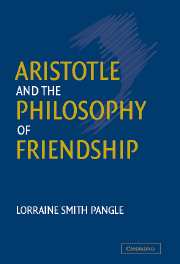Book contents
- Frontmatter
- Contents
- Acknowledgments
- Introduction
- 1 The Challenge of Plato's Lysis
- 2 The Three Kinds of Friendship
- 3 Aristotle and Montaigne on Friendship as the Greatest Good
- 4 Friendships in Politics and the Family
- 5 Cicero's Laelius: Political Friendship at Its Best
- 6 Quarrels, Conflicting Claims, and Dissolutions
- 7 Friends as Other Selves
- 8 Goodwill, Concord, and the Love of Benefactors
- 9 Self-Love and Noble Sacrifice
- 10 Friendship in the Happy Life
- Notes
- Bibliography of Modern Works and Editions
- Index of Names
6 - Quarrels, Conflicting Claims, and Dissolutions
Published online by Cambridge University Press: 04 July 2009
- Frontmatter
- Contents
- Acknowledgments
- Introduction
- 1 The Challenge of Plato's Lysis
- 2 The Three Kinds of Friendship
- 3 Aristotle and Montaigne on Friendship as the Greatest Good
- 4 Friendships in Politics and the Family
- 5 Cicero's Laelius: Political Friendship at Its Best
- 6 Quarrels, Conflicting Claims, and Dissolutions
- 7 Friends as Other Selves
- 8 Goodwill, Concord, and the Love of Benefactors
- 9 Self-Love and Noble Sacrifice
- 10 Friendship in the Happy Life
- Notes
- Bibliography of Modern Works and Editions
- Index of Names
Summary
In Nicomachean Ethics 8.13–8.14, Aristotle returns from a discussion of friendship in politics and the family to his broader theme of friendship and equality. Here, in the course of examining the reproaches and quarrels that arise in certain confused or deceptive forms of utilitarian friendship, he in fact offers his most profound reflections on the critical question of the relation of friendship to justice. Aristotle opens 8.13 with an explicit return to his threefold classification of friendships as based on utility, pleasure, and virtue. The sympathetic concern that grows out of kinship or similarity, which had come to appear as a fourth and crucial root of friendship, and which figured prominently in the previous chapters, now recedes again from the picture. Instead, Aristotle focuses attention on the difficulties of establishing and maintaining equality between friends, especially when their capacities differ greatly, reminding us of the unsolved questions of what motivates benefactors to act as they do, and how most unequal friendships can ever really be balanced to everyone's satisfaction.
Quarrels
“Complaints and reproaches arise solely or chiefly in friendships of utility, and with good reason,” Aristotle says (1162b5–6). But the reasons he goes on to give to explain why complaints and reproaches do not arise in friendships of virtue and pleasure in fact indicate just how unusual these friendships would have to be to be perfectly free of grievances:
Those who are friends on the basis of virtue are eager to do good to one another, for this belongs to virtue as well as to friendship, and for those who vie with one another in this way, there are no complaints or quarrels. No one is annoyed with one who loves and benefits him, but if he is cultivated, he retaliates by doing good in return. The one who surpasses the other, achieving what he aims at, will have no complaint against his friend. For each desires the good.
(1162b6–13)- Type
- Chapter
- Information
- Aristotle and the Philosophy of Friendship , pp. 123 - 141Publisher: Cambridge University PressPrint publication year: 2002



